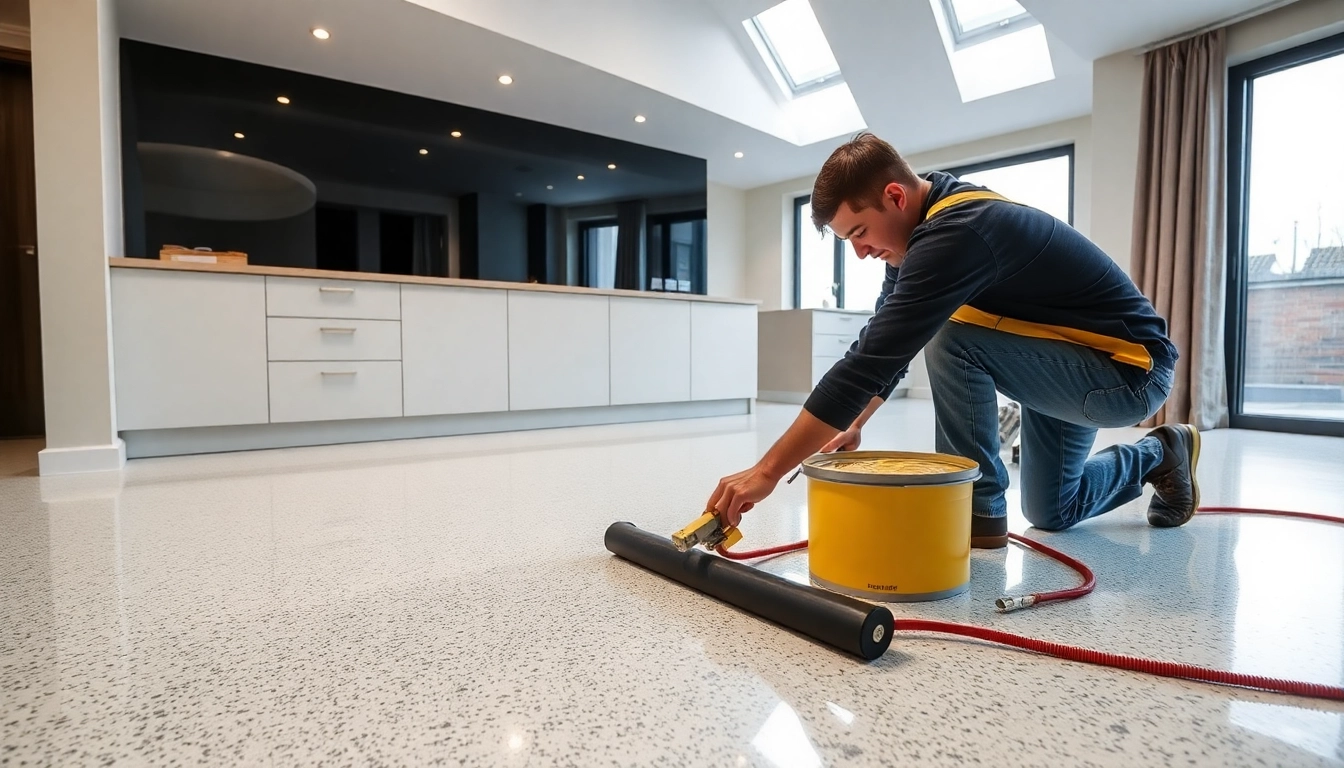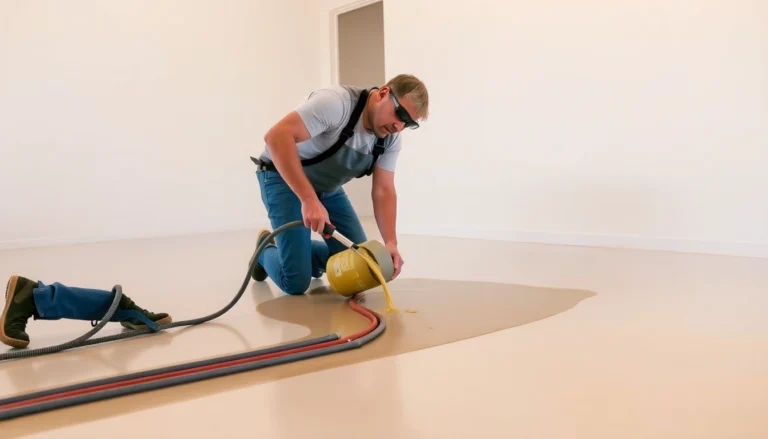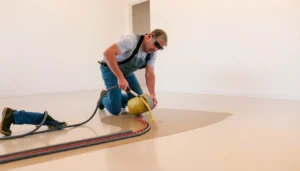Understanding Liquid Screeding and Its Benefits in Birmingham
When it comes to creating flawless flooring systems, liquid screeding has rapidly become the preferred choice for builders and property owners across Birmingham. Its ability to deliver smooth, durable, and evenly leveled floors makes it an excellent solution for various applications, including underfloor heating and modern commercial and residential developments. For those seeking expertise and quality in liquid screeding services, liquid screeding Birmingham offers a comprehensive solution that combines innovation, reliability, and professional craftsmanship.
What Is Liquid Screed and How Does It Work?
Liquid screed is a pumpable, free-flowing material primarily composed of cement, water, and fine aggregates. Unlike traditional sand-and-cement screeds, liquid screed is designed to be poured and leveled effortlessly over large areas in a rapid, uniform manner. It spreads evenly across the substrate, filling in all irregularities, cracks, and cavities, resulting in a perfectly smooth surface ready for final floor coverings. Its viscosity and flow characteristics allow for precise control during application, making it suitable for complex layouts and underfloor heating integrations.
Advantages of Using Liquid Screeding in Birmingham Projects
Implementing liquid screed in Birmingham construction projects offers multiple benefits. Firstly, its rapid setting and curing times can significantly reduce project timelines, especially when paired with underfloor heating systems. Secondly, liquid screed’s superior compaction and minimal air pockets increase the longevity and durability of floors, reducing maintenance costs over time. Additionally, its excellent thermal conductivity enhances the efficiency of underfloor heating systems, ensuring even heat distribution and lower energy consumption. The adaptability of liquid screed’s application also makes it ideal for both bespoke residential builds and large-scale commercial developments.
Common Challenges and How Liquid Screed Overcomes Them
Traditional screeding methods often face issues like cracking, uneven surfaces, and prolonged drying times. Liquid screed addresses these challenges effectively through its homogeneous composition and controlled application process. It minimizes the risk of cracking due to its flexible, self-leveling properties and consistent curing process. Moreover, its fast-setting nature ensures quicker project completion, reducing delays caused by prolonged drying periods. When combined with skilled installation practices, liquid screed provides a resilient foundation capable of withstanding heavy loads and temperature fluctuations common in Birmingham’s varied climate.
Step-by-Step Guide to Installing Liquid Screeding in Birmingham
Preparing Your Site for Liquid Screed Application
Proper preparation is crucial to a successful liquid screed installation. Begin with clearing the site of debris, dust, and loose materials to ensure a clean base. Next, inspect the existing substrate for levelness, cracks, or moisture issues, addressing them prior to screeding. Moisture barriers or insulation layers should be installed where necessary, especially in areas requiring underfloor heating. Precise site measurements and ensuring proper access for equipment are vital for an efficient pouring process. Consulting with experienced local contractors can help tailor the preparation to Birmingham’s specific construction standards and environmental conditions.
Choosing the Right Type of Liquid Screed for Your Needs
There are several formulations of liquid screed, each suited to different project requirements. A standard cement-based screed is suitable for most residential and commercial floors, providing a strong, durable surface. For projects involving underfloor heating, a specialized flowable screed with enhanced thermal conductivity is recommended. Rapid-set variants are ideal for tight schedules, whereas traditional formulations may be better for complex, high-precision applications. Collaborating with a knowledgeable supplier ensures you select the right type, balancing cost, performance, and curing time for your Birmingham project.
Application, Curing, and Final Finishing Procedures
The application process involves pouring the liquid screed uniformly across the prepared surface using pumps fitted with flexible hoses. Skilled operators ensure proper leveling, often employing laser-guided screeding tools for precision. Once poured, the screed is left to self-level and cure, typically over 24-48 hours, depending on the formulation. During curing, maintaining optimal temperature and humidity levels is essential to prevent cracks and ensure proper strength development. Finishing touches, such as surface smoothing or priming, are performed once the screed has fully cured, ready to accommodate final floor finishes like tiles, carpets, or hardwood.
Best Practices for Maintaining and Maximizing Your Liquid Screed Floors
Regular Inspections and Early Issue Detection
Long-term performance of liquid screed floors depends on vigilant maintenance. Periodic inspections should focus on identifying cracking, uneven settling, or surface deterioration early. Addressing minor issues promptly prevents costly repairs later, ensuring the structural integrity and aesthetic appeal of your floors. Using moisture meters or crack monitors can aid in ongoing assessments, especially in climates like Birmingham’s, where moisture fluctuations are common.
Integrating Underfloor Heating with Liquid Screed
One of the key advantages of liquid screed is its compatibility with underfloor heating systems. Proper integration involves laying heating pipes or cables within the screed layer, ensuring even coverage and thermal contact. Circulation of warm water or electric heating elements is then tested for leaks or faults before covering with tiles, carpets, or other finishes. Optimizing the screed’s thermal conductivity and thickness enhances heat efficiency, potentially reducing energy bills and providing comfortable indoor temperatures.
Long-Term Care and Repair Strategies for Durability
Maintaining durable liquid screed floors involves avoiding excessive impact or abrasive activities that could compromise the surface. Regular cleaning with mild detergents and avoiding overexposure to moisture helps preserve the integrity. In cases of minor cracks or surface wear, patch repairs using similar screed formulations restore surface uniformity. For extensive damage, consulting professional screeders ensures that repairs are correctly performed, maintaining the overall performance of the floor system.
Choosing the Right Liquid Screeding Contractor in Birmingham
Key Qualifications and Experience to Look For
Selecting a reputable contractor is essential for successful liquid screed installation. Look for companies with proven experience in Birmingham’s construction scene, demonstrating a portfolio of completed projects. Certifications, industry accreditations, and adherence to safety standards also reflect professionalism and reliability. An experienced team understands local building codes, environmental factors, and advanced application techniques, ensuring your project’s durability and compliance.
Questions to Ask Before Hiring a Screeding Specialist
Before making your decision, inquire about key aspects such as project timelines, types of screed used, references from past clients, and warranties offered. Clarify the company’s experience with underfloor heating integration if applicable. Discuss their approach to site preparation, curing protocols, and post-installation support. Transparent communication and detailed proposals indicate a contractor’s dedication to quality and customer satisfaction.
Case Studies of Successful Projects in Birmingham
Numerous local projects showcase the high standards achievable with professional liquid screeding. For instance, a Birmingham residential development utilized rapid-set, thermally conductive screed to facilitate underfloor heating, resulting in energy-efficient living spaces and swift completion. Commercial offices in the city center benefited from self-leveling screed that supported intricate floor layouts, demonstrating versatility and precision. These case studies highlight how expert installation directly contributes to long-term performance and client satisfaction.
Performance Metrics and Cost Considerations for Liquid Screeding Projects
Measuring Quality and Longevity of Screed Installations
Assessing the quality involves checking for levelness (typically within 3mm over 2 meters), surface finish, and absence of cracks or hollow spots. Use of moisture content meters ensures the screed has cured adequately, typically below 2% for floor covering installation. Long-term durability is gauged by resistance to cracking, wear, and thermal performance, especially when paired with underfloor heating systems.
Cost Breakdown and Budgeting Tips
Pricing for liquid screeding varies based on project size, formulation, and site complexity. Generally, costs include materials, labor, site preparation, and finishing. Bulk projects benefit from volume discounts, while specialized screeds with fast curing or enhanced thermal properties may carry premium costs. Budget planning should also include contingencies for minor repairs or adjustments post-installation. Consulting with experienced Birmingham-based contractors can help obtain accurate quotes tailored to your project scope.
Timeframes and Project Completion Expectations
Liquid screeding typically requires 1-2 days for pouring, with initial setting in 24 hours and full curing within 7-28 days. Underfloor heating integration can extend this timeline slightly due to system installation and testing procedures. Early planning and coordinated scheduling with other trades ensure smooth progression from site preparation to final flooring. Clear communication about milestones helps set realistic expectations and meet project deadlines efficiently.






